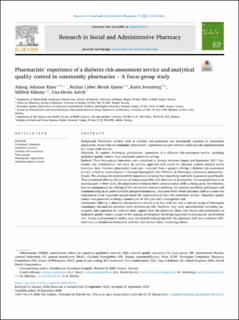Pharmacists’ experience of a diabetes risk-assessment service and analytical quality control in community pharmacies : a focus-group study
Risøy, Aslaug Johanne; Kjome, Reidun Lisbet Skeide; Svensberg, Karin; Råheim, Målfrid; Sølvik, Una Ørvim
Peer reviewed, Journal article
Published version

Åpne
Permanent lenke
https://hdl.handle.net/11250/3032075Utgivelsesdato
2021Metadata
Vis full innførselSamlinger
- Artikler [382]
- Publikasjoner fra Cristin [398]
Originalversjon
Research in Social and Administrative Pharmacy, 2021, 17 (7), 1259-1266 10.1016/j.sapharm.2020.09.011Sammendrag
Background
Healthcare services such as diabetes risk-assessment are increasingly common in community pharmacies. Knowledge of community pharmacists’ experiences of such services could ease the implementation of a larger-scale service.
Objectives
To explore Norwegian pharmacists’ experience of a diabetes risk-assessment service, including analytical quality control, in a community-pharmacy setting.
Methods
Three focus-group interviews were conducted in Norway between August and September 2017. Systematic text condensation was used, an analytic approach well suited for thematic content analysis across interview data. Fourteen pharmacists took part, recruited from a project offering a diabetes risk-assessment service, including measurements of Glycated hemoglobin A1c (HbA1c), in Norwegian community pharmacies.
Results
The pharmacists emphasized the importance of using their knowledge and skills to promote good health. They considered offering this service as being compatible with their role as pharmacists. As communication is an essential part of their work, the pharmacists evaluated their communication skills as being good. Nevertheless, how to communicate the offering of this service was seen as a challenge, for instance recruiting participants and communicating in an understandable and professional way. Inclusion of the whole pharmacy staff as a team was experienced as an important success factor for implementation of a risk-assessment service. Analytical quality control was perceived as being a natural part of their job and a manageable task.
Conclusions
Offering a diabetes risk-assessment service is in line with the way a selected group of Norwegian community pharmacists perceived their professional role. However, they were uncomfortable recruiting participants, and expressed the wish for more support from the pharmacy chain. Our results add performance of analytical quality control as part of the ongoing development involving expansion of pharmacists' professional role. Future implementation studies may also benefit from giving both the pharmacy staff and customers sufficient time to familiarize themselves with the new service before measuring effects.
Keywords: community pharmacy, healthcare services, diabetes risk assessment, focus groups, pharmacists' experiences, analytical quality control
